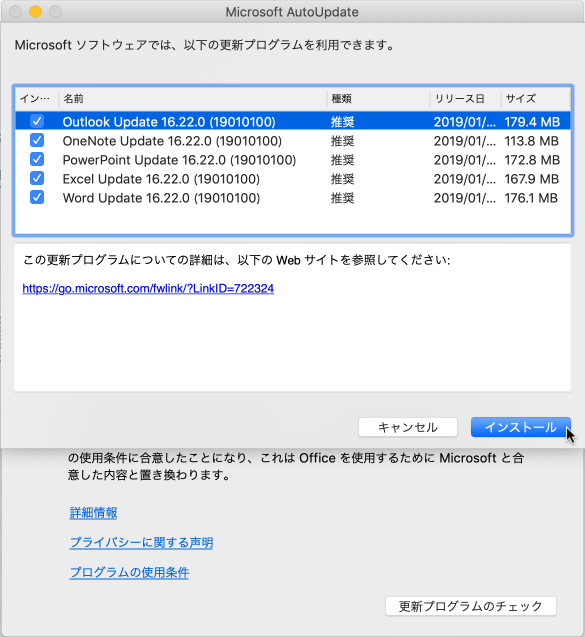Aug 06, 2019 Microsoft AutoUpdate Mac virus removal Aug 2019 Mac malware is booming, with various adware and rogue antispyware strains steadily gearing up for a rise. A particularly deleterious vector of attacks, though, spans phishing and other forms of social engineering that target users’ credentials and personal data. Nothing but update errors through build 4.19 which looks completely different from previous builds (like the image above). In the past AutoUpdate had never issues updating the Office 365 apps but now after downloading the update for each apps has finished installation starts and always fails (without any explanation of course).
Applies to:Office for Mac, Office 2019 for Mac, Office 2016 for Mac
Microsoft AutoUpdate (MAU) version 3.18 and later includes the msupdate command-line tool. This can be used to start the update process for Microsoft applications produced for Mac, such as Office. The tool is primarily designed for IT administrators so that they have more precise control over when updates are applied. You can download the latest version of MAU from this link.
msupdate works by sending Apple Events to the MAU daemon. On macOS 10.14 Mojave and later, you may see a privacy prompt when running msupdate for the first time. If you are using an enterprise management tool such as Jamf Pro, you should deploy a Privacy Preferences Policy Control (PPPC) payload to pre-approve access. Samples of such a payload can be downloaded from here.
Moreover, MacSpeech Dictate Medical NEVER misspells a word - typos are a thing of the past. Of course, you can continue to increase accuracy as you use MacSpeech Dictate Medical. Dictate in microsoft word mac. Near perfection.
Use the following steps to start using the tool:
- Open the Terminal application
- Enter
cd /Library/Application Support/Microsoft/MAU2.0/Microsoft AutoUpdate.app/Contents/MacOS - Run
./msupdate --help
The following options are displayed:
Jun 19, 2018 Just open it up and run through a scan, and then go into the System Junk section to identify all of the cache files and other things that you can clean up. Once you’ve selected what you want or don’t want to clean, just click the Clean button. Aug 04, 2015 Office 2016 MAC Where is the (new) Microsoft User Data folder. Previously you wonderfully could always include the Microsoft User Data folder to your backup and if there was some trouble, the defective DB could be simple be replaced by the 'old' one. Clean up microsoft user data mac. How to clean up Mac with CleanMyMac X: Download CleanMyMac X (a link to a free edition of the app) Launch the program. Go to the Large and Old Files section on the menu. Review the details, select what to clean and then click Clean. Remove old iOS backups. Having your files backed up is a wonderful thing.

Examples of how to use msupdate
Microsoft Autoupdate Mac
- Display the current configuration parameters for AutoUpdate:
./msupdate --config - Display the current configuration parameters in machine-readable format:
./msupdate --config --format plist - List all available updates:
./msupdate --list - Download and install all available updates:
./msupdate --install - Download and install the latest updates for Word, Excel, and PowerPoint:
./msupdate --install --apps MSWD2019 XCEL2019 PPT32019 - Download and install a version-specific update for Outlook:
./msupdate --install --apps OPIM2019 --version 16.17.180090901
Application identifiers
The following table lists the applications for Mac supported by AutoUpdate. The identifier is used when specifying the --apps parameter. When specifying multiple applications on the command-line, separate identifiers with a space.
| Application | Latest version1 | 2016 version2 |
|---|---|---|
| Word | MSWD2019 | MSWD15 |
| Excel | XCEL2019 | XCEL15 |
| PowerPoint | PPT32019 | PPT315 |
| Outlook | OPIM2019 | OPIM15 |
| OneNote | ONMC2019 | ONMC15 |
| MAU | MSau04 | MSau04 |
| OneDrive | ONDR18 | |
| Teams | TEAM01 | |
| Skype for Business | MSFB16 | |
| Remote Desktop | MSRD10 | |
| Intune Company Portal | IMCP01 | |
| Defender ATP | WDAV00 | |
| Edge Canary | EDCN01 | |
| Edge Dev | EDDV01 | |
| Edge Beta | EDBT01 | |
| Edge Stable | EDGE01 |
Microsoft Update Site
1 These identifiers are used for Office 2019 for Mac, either a retail or a volume licensed version, and for Office for Mac (from an Office 365 plan) running on macOS version 10.12 (Sierra) or higher.
2 These identifiers are used for Office 2016 for Mac, either a retail or a volume licensed version, and for Office for Mac (from an Office 365 plan) running on macOS version 10.11 (El Capitan) or earlier.
Note
- If an update is pending for MAU itself, that update must be applied before any applications can be updated.
- Identifiers are not case-sensitive when run interactively from the command-line, but use the character casing from the table above when running from a management tool such as Jamf Pro.
Related topics
- Update history and release notes for Office for Mac